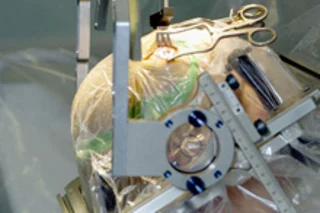Inserting a "pacemaker" into the brain to emit regular pulses of electricity and quell disordered neural activity may sound like a therapy of last resort, but if current experiments show beneficial results the brain surgery may one day be commonplace. But some scientists are cautioning that research on so-called deep brain stimulation may be pressing ahead too quickly, and warn that long-term effects of the surgery are not yet clear. A growing number of psychiatric researchers are testing the method's effectiveness on a host of psychiatric disorders.
Until recently, deep brain stimulation was approved in the U.S. only to treat certain movement disorders, primarily those of Parkinson's disease, for which it diminishes tremors and rigidity and improves mobility. To date, more than 60,000 patients worldwide have had the devices implanted [Los Angeles Times].
But now large clinical trials are in the works that will test the use of deep brain ...














